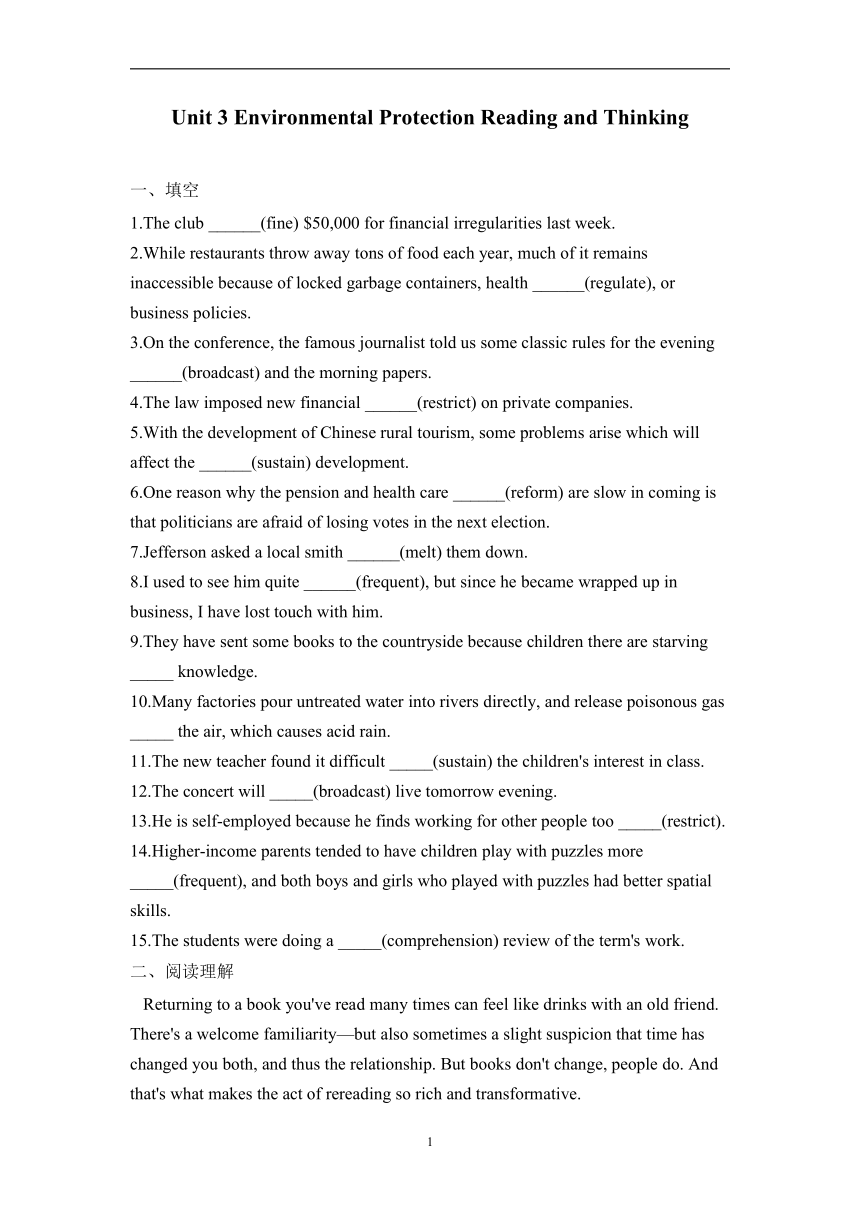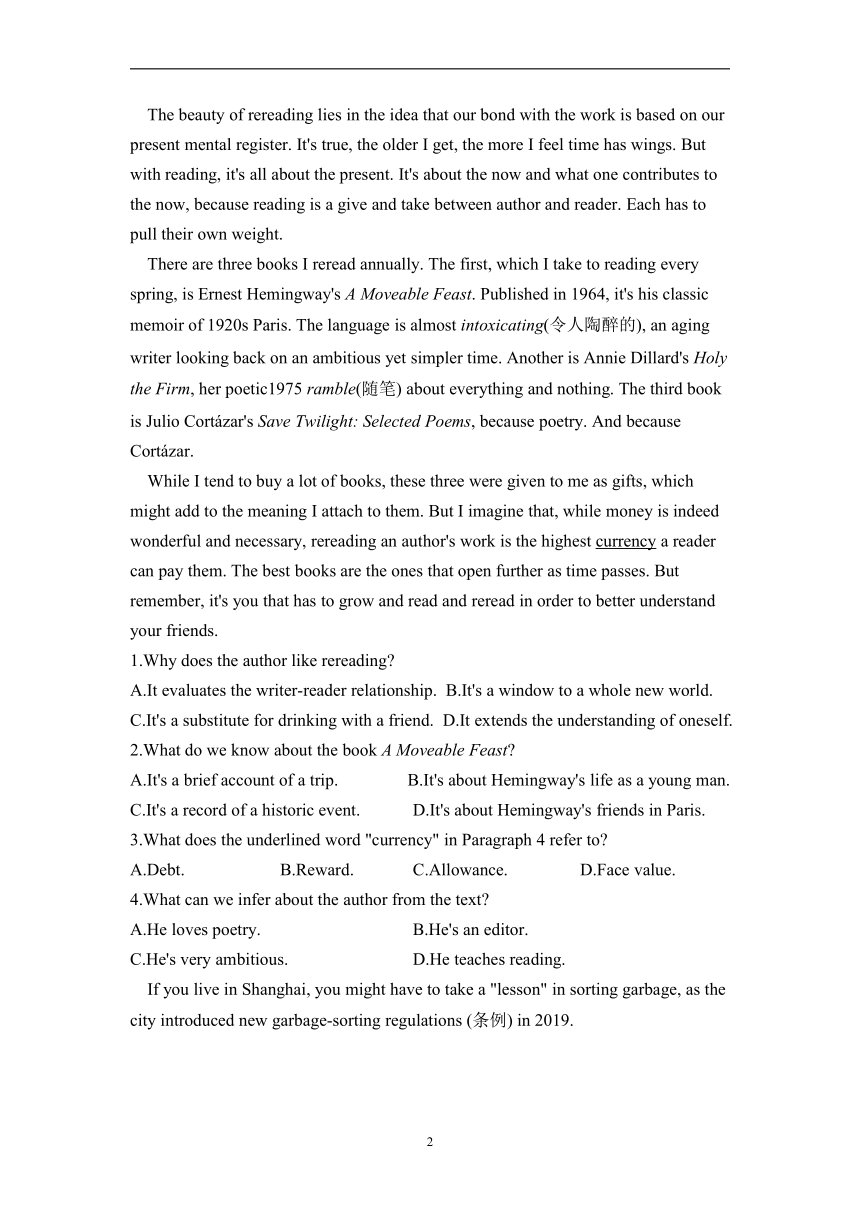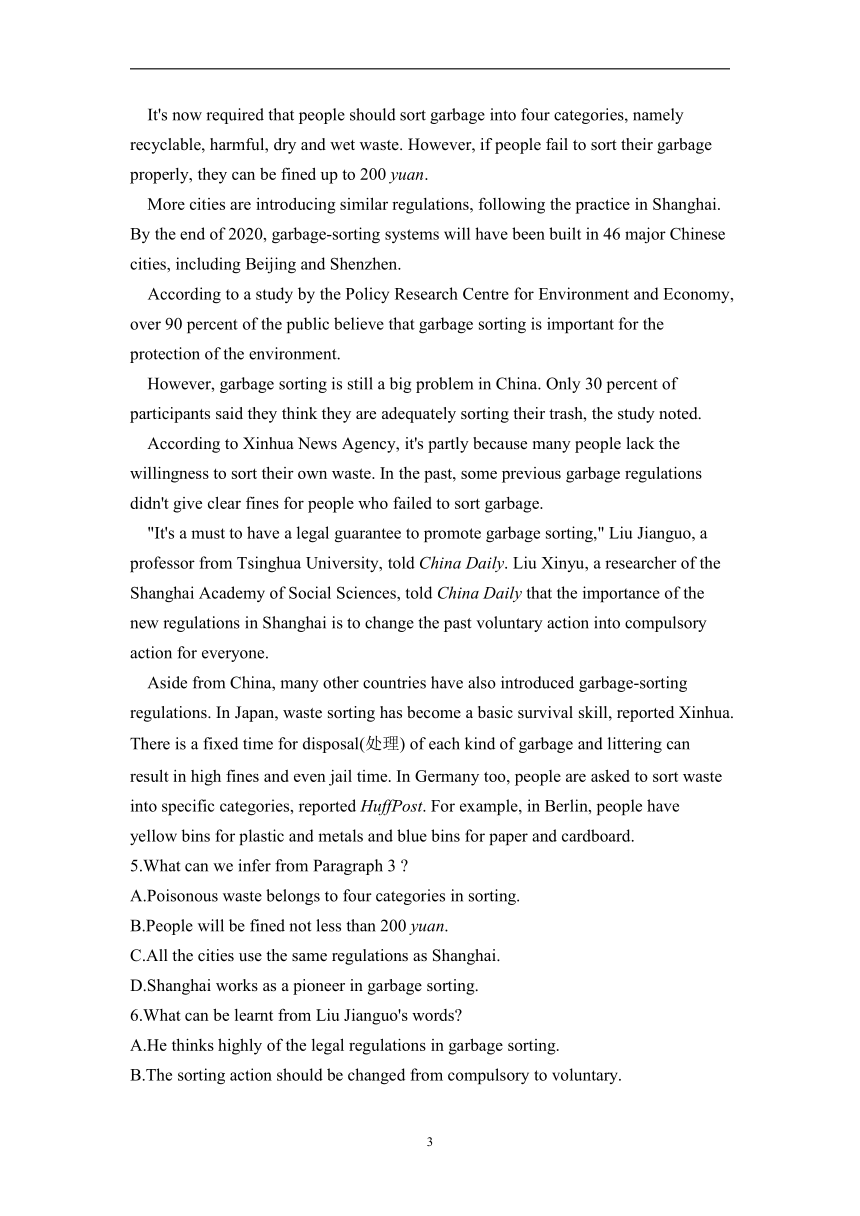人教版(2019)选择性必修 第三册Unit 3 Environmental Protection Reading and Thinking课时练习(有答案)
文档属性
| 名称 | 人教版(2019)选择性必修 第三册Unit 3 Environmental Protection Reading and Thinking课时练习(有答案) |  | |
| 格式 | docx | ||
| 文件大小 | 24.0KB | ||
| 资源类型 | 教案 | ||
| 版本资源 | 人教版(2019) | ||
| 科目 | 英语 | ||
| 更新时间 | 2023-03-07 12:28:05 | ||
图片预览



文档简介
Unit 3 Environmental Protection Reading and Thinking
一、填空
1.The club ______(fine) $50,000 for financial irregularities last week.
2.While restaurants throw away tons of food each year, much of it remains inaccessible because of locked garbage containers, health ______(regulate), or business policies.
3.On the conference, the famous journalist told us some classic rules for the evening ______(broadcast) and the morning papers.
4.The law imposed new financial ______(restrict) on private companies.
5.With the development of Chinese rural tourism, some problems arise which will affect the ______(sustain) development.
6.One reason why the pension and health care ______(reform) are slow in coming is that politicians are afraid of losing votes in the next election.
7.Jefferson asked a local smith ______(melt) them down.
8.I used to see him quite ______(frequent), but since he became wrapped up in business, I have lost touch with him.
9.They have sent some books to the countryside because children there are starving _____ knowledge.
10.Many factories pour untreated water into rivers directly, and release poisonous gas _____ the air, which causes acid rain.
11.The new teacher found it difficult _____(sustain) the children's interest in class.
12.The concert will _____(broadcast) live tomorrow evening.
13.He is self-employed because he finds working for other people too _____(restrict).
14.Higher-income parents tended to have children play with puzzles more _____(frequent), and both boys and girls who played with puzzles had better spatial skills.
15.The students were doing a _____(comprehension) review of the term's work.
二、阅读理解
Returning to a book you've read many times can feel like drinks with an old friend. There's a welcome familiarity—but also sometimes a slight suspicion that time has changed you both, and thus the relationship. But books don't change, people do. And that's what makes the act of rereading so rich and transformative.
The beauty of rereading lies in the idea that our bond with the work is based on our present mental register. It's true, the older I get, the more I feel time has wings. But with reading, it's all about the present. It's about the now and what one contributes to the now, because reading is a give and take between author and reader. Each has to pull their own weight.
There are three books I reread annually. The first, which I take to reading every spring, is Ernest Hemingway's A Moveable Feast. Published in 1964, it's his classic memoir of 1920s Paris. The language is almost intoxicating(令人陶醉的), an aging writer looking back on an ambitious yet simpler time. Another is Annie Dillard's Holy the Firm, her poetic1975 ramble(随笔) about everything and nothing. The third book is Julio Cortázar's Save Twilight: Selected Poems, because poetry. And because Cortázar.
While I tend to buy a lot of books, these three were given to me as gifts, which might add to the meaning I attach to them. But I imagine that, while money is indeed wonderful and necessary, rereading an author's work is the highest currency a reader can pay them. The best books are the ones that open further as time passes. But remember, it's you that has to grow and read and reread in order to better understand your friends.
1.Why does the author like rereading
A.It evaluates the writer-reader relationship. B.It's a window to a whole new world.
C.It's a substitute for drinking with a friend. D.It extends the understanding of oneself.
2.What do we know about the book A Moveable Feast
A.It's a brief account of a trip. B.It's about Hemingway's life as a young man.
C.It's a record of a historic event. D.It's about Hemingway's friends in Paris.
3.What does the underlined word "currency" in Paragraph 4 refer to
A.Debt. B.Reward. C.Allowance. D.Face value.
4.What can we infer about the author from the text
A.He loves poetry. B.He's an editor.
C.He's very ambitious. D.He teaches reading.
If you live in Shanghai, you might have to take a "lesson" in sorting garbage, as the city introduced new garbage-sorting regulations (条例) in 2019.
It's now required that people should sort garbage into four categories, namely recyclable, harmful, dry and wet waste. However, if people fail to sort their garbage properly, they can be fined up to 200 yuan.
More cities are introducing similar regulations, following the practice in Shanghai. By the end of 2020, garbage-sorting systems will have been built in 46 major Chinese cities, including Beijing and Shenzhen.
According to a study by the Policy Research Centre for Environment and Economy, over 90 percent of the public believe that garbage sorting is important for the protection of the environment.
However, garbage sorting is still a big problem in China. Only 30 percent of participants said they think they are adequately sorting their trash, the study noted.
According to Xinhua News Agency, it's partly because many people lack the willingness to sort their own waste. In the past, some previous garbage regulations didn't give clear fines for people who failed to sort garbage.
"It's a must to have a legal guarantee to promote garbage sorting," Liu Jianguo, a professor from Tsinghua University, told China Daily. Liu Xinyu, a researcher of the Shanghai Academy of Social Sciences, told China Daily that the importance of the new regulations in Shanghai is to change the past voluntary action into compulsory action for everyone.
Aside from China, many other countries have also introduced garbage-sorting regulations. In Japan, waste sorting has become a basic survival skill, reported Xinhua. There is a fixed time for disposal(处理) of each kind of garbage and littering can result in high fines and even jail time. In Germany too, people are asked to sort waste into specific categories, reported HuffPost. For example, in Berlin, people have yellow bins for plastic and metals and blue bins for paper and cardboard.
5.What can we infer from Paragraph 3
A.Poisonous waste belongs to four categories in sorting.
B.People will be fined not less than 200 yuan.
C.All the cities use the same regulations as Shanghai.
D.Shanghai works as a pioneer in garbage sorting.
6.What can be learnt from Liu Jianguo's words
A.He thinks highly of the legal regulations in garbage sorting.
B.The sorting action should be changed from compulsory to voluntary.
C.A legal guarantee is a must to promote garbage sorting.
D.There is a growing concern over garbage sorting worldwide.
7.What does the article mainly talk about
A.Why garbage sorting is important.
B.How other countries sort garbage.
C.Garbage sorting has started in China.
D.The world's garbage problem is becoming worse.
答案以及解析
一、填空
1.答案:was fined
2.答案:regulations
3.答案:broadcasts
4.答案:restrictions
5.答案:sustainable
6.答案:reforms
7.答案:to melt
8.答案:frequently
9.答案:for
解析:句意:他们给乡村送了一些书,因为那里的孩子们渴望知识。starve for渴望,是固定搭配。
10.答案:into
解析:句意:许多工厂将未经处理的水直接排入河流,向空气中释放有毒气体,这导致了酸雨。release...into...把……排入……
11.答案:to sustain
解析:句意:这位新老师发现在课堂上维持孩子们的兴趣点很难。it为形式宾语,故用动词不定式作真正的宾语。
12.答案:be broadcast/ broadcasted
解析:句意:音乐会明晚将进行现场直播。broadcast和concert是动宾关系,故用被动语态。
13.答案:restrictive
解析:句意:他自谋职业是因为他觉得为别人打工限制性太强。restrictive限制性的;约束的。
14.答案:frequently
解析:句意:高收入父母倾向于让孩子更频繁地玩拼图,玩拼图的男孩和女孩都有更好的空间感。所填词修饰动词play,故用副词形式。
15.答案:comprehensive
解析:句意:学生们正在进行整学期功课的综合复习。所填的词修饰名词,故用形容词形式。
二、阅读理解
答案:1-4 DBBA
解析:1.推理判断题。根据第一段最后两句"But books don't change, people do. And that's what makes the act of rereading so rich and transformative."和第二段中"The beauty of rereading lies in the idea that our bond with the work is based on our present mental register. It's true, the older I get, the more I feel time has wings."可推知, 作者喜欢重新阅读是因为重新阅读可以扩展对自己的理解。故选D项。
2.推理判断题。根据倒数第二段中的"Published in 1964, it's his classic memoir of 1920s Paris."及"an aging writer looking back on an ambitious yet simpler time"可判断出, A Moveable Feast是关于海明威年轻时的生活的。故选B项。
3.词义猜测题。根据最后一段第二句可知, 作者认为, 虽然金钱确实是美妙而必要的, 但重读作家的著作是读者对该作家的最高奖励, 因此画线词在此处指奖励。
4.推理判断题。根据倒数第二段中的"The third book is Julio Cortázar's Save Twilight: Selected Poems, because poetry."可知, 作者是由于喜欢诗歌而喜欢这本书的。故选A项。
答案:5-7.DCC
解析:5.推理判断题。根据第三段中的More cities are introducing similar regulations, following the practice in Shanghai.可知,继上海之后,更多的城市也即将推出类似的条例。由此可见上海是垃圾分类的先驱。故选D项。
6.细节理解题。根据倒数第二段中的"It's a must to have a legal guarantee to promote garbage sorting," Liu Jianguo, a professor from Tsinghua University, told China Daily.可知,刘建国认为必须要有一套法律保障来推动垃圾分类。故选C项。
7.主旨大意题。综观全文可知,上海市正式实施《上海市生活垃圾管理条例》,之后北京等46个重点城市也将加人垃圾分类的行列。故本文主要内容为垃圾分类在中国已经开始。故选C项。
2
一、填空
1.The club ______(fine) $50,000 for financial irregularities last week.
2.While restaurants throw away tons of food each year, much of it remains inaccessible because of locked garbage containers, health ______(regulate), or business policies.
3.On the conference, the famous journalist told us some classic rules for the evening ______(broadcast) and the morning papers.
4.The law imposed new financial ______(restrict) on private companies.
5.With the development of Chinese rural tourism, some problems arise which will affect the ______(sustain) development.
6.One reason why the pension and health care ______(reform) are slow in coming is that politicians are afraid of losing votes in the next election.
7.Jefferson asked a local smith ______(melt) them down.
8.I used to see him quite ______(frequent), but since he became wrapped up in business, I have lost touch with him.
9.They have sent some books to the countryside because children there are starving _____ knowledge.
10.Many factories pour untreated water into rivers directly, and release poisonous gas _____ the air, which causes acid rain.
11.The new teacher found it difficult _____(sustain) the children's interest in class.
12.The concert will _____(broadcast) live tomorrow evening.
13.He is self-employed because he finds working for other people too _____(restrict).
14.Higher-income parents tended to have children play with puzzles more _____(frequent), and both boys and girls who played with puzzles had better spatial skills.
15.The students were doing a _____(comprehension) review of the term's work.
二、阅读理解
Returning to a book you've read many times can feel like drinks with an old friend. There's a welcome familiarity—but also sometimes a slight suspicion that time has changed you both, and thus the relationship. But books don't change, people do. And that's what makes the act of rereading so rich and transformative.
The beauty of rereading lies in the idea that our bond with the work is based on our present mental register. It's true, the older I get, the more I feel time has wings. But with reading, it's all about the present. It's about the now and what one contributes to the now, because reading is a give and take between author and reader. Each has to pull their own weight.
There are three books I reread annually. The first, which I take to reading every spring, is Ernest Hemingway's A Moveable Feast. Published in 1964, it's his classic memoir of 1920s Paris. The language is almost intoxicating(令人陶醉的), an aging writer looking back on an ambitious yet simpler time. Another is Annie Dillard's Holy the Firm, her poetic1975 ramble(随笔) about everything and nothing. The third book is Julio Cortázar's Save Twilight: Selected Poems, because poetry. And because Cortázar.
While I tend to buy a lot of books, these three were given to me as gifts, which might add to the meaning I attach to them. But I imagine that, while money is indeed wonderful and necessary, rereading an author's work is the highest currency a reader can pay them. The best books are the ones that open further as time passes. But remember, it's you that has to grow and read and reread in order to better understand your friends.
1.Why does the author like rereading
A.It evaluates the writer-reader relationship. B.It's a window to a whole new world.
C.It's a substitute for drinking with a friend. D.It extends the understanding of oneself.
2.What do we know about the book A Moveable Feast
A.It's a brief account of a trip. B.It's about Hemingway's life as a young man.
C.It's a record of a historic event. D.It's about Hemingway's friends in Paris.
3.What does the underlined word "currency" in Paragraph 4 refer to
A.Debt. B.Reward. C.Allowance. D.Face value.
4.What can we infer about the author from the text
A.He loves poetry. B.He's an editor.
C.He's very ambitious. D.He teaches reading.
If you live in Shanghai, you might have to take a "lesson" in sorting garbage, as the city introduced new garbage-sorting regulations (条例) in 2019.
It's now required that people should sort garbage into four categories, namely recyclable, harmful, dry and wet waste. However, if people fail to sort their garbage properly, they can be fined up to 200 yuan.
More cities are introducing similar regulations, following the practice in Shanghai. By the end of 2020, garbage-sorting systems will have been built in 46 major Chinese cities, including Beijing and Shenzhen.
According to a study by the Policy Research Centre for Environment and Economy, over 90 percent of the public believe that garbage sorting is important for the protection of the environment.
However, garbage sorting is still a big problem in China. Only 30 percent of participants said they think they are adequately sorting their trash, the study noted.
According to Xinhua News Agency, it's partly because many people lack the willingness to sort their own waste. In the past, some previous garbage regulations didn't give clear fines for people who failed to sort garbage.
"It's a must to have a legal guarantee to promote garbage sorting," Liu Jianguo, a professor from Tsinghua University, told China Daily. Liu Xinyu, a researcher of the Shanghai Academy of Social Sciences, told China Daily that the importance of the new regulations in Shanghai is to change the past voluntary action into compulsory action for everyone.
Aside from China, many other countries have also introduced garbage-sorting regulations. In Japan, waste sorting has become a basic survival skill, reported Xinhua. There is a fixed time for disposal(处理) of each kind of garbage and littering can result in high fines and even jail time. In Germany too, people are asked to sort waste into specific categories, reported HuffPost. For example, in Berlin, people have yellow bins for plastic and metals and blue bins for paper and cardboard.
5.What can we infer from Paragraph 3
A.Poisonous waste belongs to four categories in sorting.
B.People will be fined not less than 200 yuan.
C.All the cities use the same regulations as Shanghai.
D.Shanghai works as a pioneer in garbage sorting.
6.What can be learnt from Liu Jianguo's words
A.He thinks highly of the legal regulations in garbage sorting.
B.The sorting action should be changed from compulsory to voluntary.
C.A legal guarantee is a must to promote garbage sorting.
D.There is a growing concern over garbage sorting worldwide.
7.What does the article mainly talk about
A.Why garbage sorting is important.
B.How other countries sort garbage.
C.Garbage sorting has started in China.
D.The world's garbage problem is becoming worse.
答案以及解析
一、填空
1.答案:was fined
2.答案:regulations
3.答案:broadcasts
4.答案:restrictions
5.答案:sustainable
6.答案:reforms
7.答案:to melt
8.答案:frequently
9.答案:for
解析:句意:他们给乡村送了一些书,因为那里的孩子们渴望知识。starve for渴望,是固定搭配。
10.答案:into
解析:句意:许多工厂将未经处理的水直接排入河流,向空气中释放有毒气体,这导致了酸雨。release...into...把……排入……
11.答案:to sustain
解析:句意:这位新老师发现在课堂上维持孩子们的兴趣点很难。it为形式宾语,故用动词不定式作真正的宾语。
12.答案:be broadcast/ broadcasted
解析:句意:音乐会明晚将进行现场直播。broadcast和concert是动宾关系,故用被动语态。
13.答案:restrictive
解析:句意:他自谋职业是因为他觉得为别人打工限制性太强。restrictive限制性的;约束的。
14.答案:frequently
解析:句意:高收入父母倾向于让孩子更频繁地玩拼图,玩拼图的男孩和女孩都有更好的空间感。所填词修饰动词play,故用副词形式。
15.答案:comprehensive
解析:句意:学生们正在进行整学期功课的综合复习。所填的词修饰名词,故用形容词形式。
二、阅读理解
答案:1-4 DBBA
解析:1.推理判断题。根据第一段最后两句"But books don't change, people do. And that's what makes the act of rereading so rich and transformative."和第二段中"The beauty of rereading lies in the idea that our bond with the work is based on our present mental register. It's true, the older I get, the more I feel time has wings."可推知, 作者喜欢重新阅读是因为重新阅读可以扩展对自己的理解。故选D项。
2.推理判断题。根据倒数第二段中的"Published in 1964, it's his classic memoir of 1920s Paris."及"an aging writer looking back on an ambitious yet simpler time"可判断出, A Moveable Feast是关于海明威年轻时的生活的。故选B项。
3.词义猜测题。根据最后一段第二句可知, 作者认为, 虽然金钱确实是美妙而必要的, 但重读作家的著作是读者对该作家的最高奖励, 因此画线词在此处指奖励。
4.推理判断题。根据倒数第二段中的"The third book is Julio Cortázar's Save Twilight: Selected Poems, because poetry."可知, 作者是由于喜欢诗歌而喜欢这本书的。故选A项。
答案:5-7.DCC
解析:5.推理判断题。根据第三段中的More cities are introducing similar regulations, following the practice in Shanghai.可知,继上海之后,更多的城市也即将推出类似的条例。由此可见上海是垃圾分类的先驱。故选D项。
6.细节理解题。根据倒数第二段中的"It's a must to have a legal guarantee to promote garbage sorting," Liu Jianguo, a professor from Tsinghua University, told China Daily.可知,刘建国认为必须要有一套法律保障来推动垃圾分类。故选C项。
7.主旨大意题。综观全文可知,上海市正式实施《上海市生活垃圾管理条例》,之后北京等46个重点城市也将加人垃圾分类的行列。故本文主要内容为垃圾分类在中国已经开始。故选C项。
2
